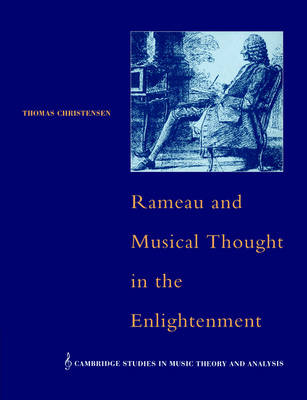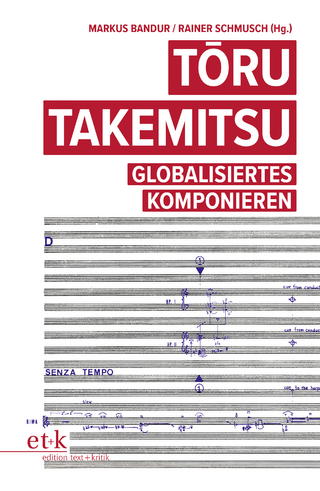
Rameau and Musical Thought in the Enlightenment
Seiten
2004
Cambridge University Press (Verlag)
978-0-521-61709-3 (ISBN)
Cambridge University Press (Verlag)
978-0-521-61709-3 (ISBN)
This is the first intellectual biography of the French composer and theorist Jean-Philippe Rameau, who synthesised the vocabulary and grammar of musical practice into a concise scientific system, earning himself the popular title of 'Newton of the Arts'. The author examines Rameau's accomplishments in the context of the musical and intellectual thought of the eighteenth century.
This is the first intellectual biography of the French composer and theorist Jean-Philippe Rameau. Rameau synthesised the vocabulary and grammar of musical practice into a concise scientific system, earning himself the popular title of 'Newton of the Arts'. Ranging widely over the musical and intellectual thought of the eighteenth century, Thomas Christensen is able to orient Rameau's accomplishments in the light of speculative and practical considerations of music theory as well as many of the scientific ideas current in the French Enlightenment. He shows how Rameau incorporates ideas ranging from neoplatonic thought and Cartesian mechanistic metaphysics to Locke's empirical psychology and Newtonian experimental science. Additional primary documents help clarify Rameau's fascinating and stormy relationship with the Encyclopedists, Diderot, Rousseau and d'Alembert.
This is the first intellectual biography of the French composer and theorist Jean-Philippe Rameau. Rameau synthesised the vocabulary and grammar of musical practice into a concise scientific system, earning himself the popular title of 'Newton of the Arts'. Ranging widely over the musical and intellectual thought of the eighteenth century, Thomas Christensen is able to orient Rameau's accomplishments in the light of speculative and practical considerations of music theory as well as many of the scientific ideas current in the French Enlightenment. He shows how Rameau incorporates ideas ranging from neoplatonic thought and Cartesian mechanistic metaphysics to Locke's empirical psychology and Newtonian experimental science. Additional primary documents help clarify Rameau's fascinating and stormy relationship with the Encyclopedists, Diderot, Rousseau and d'Alembert.
List of illustrations; Foreword by Ian Bent; Acknowledgments; Introduction; 1. Rameau and the Enlightenment; 2. Rameau as music theorist; 3. Precursors of harmonic theory; 4. The generative fundamental; 5. The fundamental bass; 6. The corps sonore; 7. Mode and modulation; 8. Rameau and the philosophes; 9. D'Alembert; 10. The final years; Appendices; Select bibliography; Index of subjects; Index of proper names.
| Erscheint lt. Verlag | 16.12.2004 |
|---|---|
| Reihe/Serie | Cambridge Studies in Music Theory and Analysis |
| Vorwort | Ian Bent |
| Zusatzinfo | 25 Halftones, unspecified; 9 Line drawings, unspecified |
| Verlagsort | Cambridge |
| Sprache | englisch |
| Maße | 189 x 246 mm |
| Gewicht | 620 g |
| Themenwelt | Kunst / Musik / Theater ► Musik ► Musiktheorie / Musiklehre |
| ISBN-10 | 0-521-61709-X / 052161709X |
| ISBN-13 | 978-0-521-61709-3 / 9780521617093 |
| Zustand | Neuware |
| Informationen gemäß Produktsicherheitsverordnung (GPSR) | |
| Haben Sie eine Frage zum Produkt? |
Mehr entdecken
aus dem Bereich
aus dem Bereich
Grundbegriffe, Harmonik, Formen, Instrumente
Buch | Softcover (2021)
Philipp Reclam (Verlag)
7,80 €
globalisiertes Komponieren
Buch | Softcover (2023)
edition text + kritik (Verlag)
49,00 €


